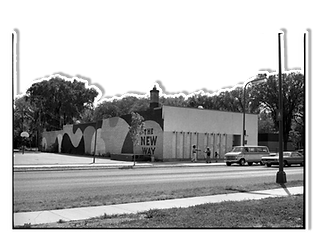





The Revolution is a band assembled by Prince in 1983, although an earlier form of the same band existed since 1979 and toured with him from 1979 to 1983. The name "The Revolution" first appeared on the cover of 1999, written in reverse underneath Prince's name. The departure of Dez Dickerson from Prince's band and his replacement with Wendy Melvoin marks "The Revolution" foundation. Although it took until the Purple Rain album for the Revolution to first be named as such. For the next four years not only the band was Prince's backing band but he credited it on three albums.

.png)
Sonny Thompson's band, The Family, became the anchor for The Way's music room, which was first opened in 1966 as a community resource center. The Way (later renamed the New Way) welcomed rival bands Grand Central, Flyte Tyme, Cohesion, and The Family to compete in Battle of the Bands competitions and concerts in the mid-1970s. Minneapolis 4th Precinct Police Station replaced the building in the early 1980s.
The Piano & a Microphone Tour was Prince's final concert tour. In an interview he said that "I’m doing it to challenge myself, I won’t know what songs I’m going to do when I go on stage. I won’t have to, because I won’t have a band".


.png)

.png)
.png)
Widely regarded as one of the greatest musicians of all time, Prince also secured his legacy as music's greatest mentor.
Prince not only wrote songs, but he played most of the instruments in the music he produced. From starring in his own films, and having the third best-selling movie soundtrack of all time, his hands-on approach gave creative power back to artists.
Prince was able to shape the sounds that still influence countless musicians to this very day.
Here is just a glimpse of his Purple Reign
.png)



Grand Central was a band formed in 1972 by Prince's cousin, drummer Charles "Chazz" Smith, Prince and
André Cymone, while still in high-school. They initially did not have a name, but when Terry Jackson joined they briefly went by Charles; Cousin & Friends, Phoenix, Sex Machine, then settling for Grand Central.

.png)

Initially they served as a live band on the sign O' The Times Tour, and later they also recorded in the studio and can be heard on on the Lovesexy album and subsequent Lovesexy Tour. Sheila E. on drums, Levi Seacer, Jr. on bass, Miko Weaver on guitar,
Dr Fink on keyboards, Boni Boyer also on keyboards, Eric Leeds on Baritone Sax and Flute and Atlanta Bliss on Trumpet.


Following the 1990 Nude Tour, Prince first started referring to his band as "The New Power Generation", a term first used in the song No. Like he did with The Revolution, Prince coupled his name with "The New Power Generation" on his two next albums.
During the early nineties the band evolved from a backing band to an entity of its own, for which Prince composed material and produced a number of albums.


.png)
.png)
The all-girl band / power trio was assembled by Prince in 2012 and became Prince's backing band for his 2014 return to Warner Music until his death in 2016. The trio consisted of the American drummer Hannah Welton, Canadian guitarist Donna Grantis and Danish bassist Ida Kristine Nielsen. Together with Prince, they released the LP Plectrumelectrum on September 30, 2014.



First Avenue was one of Prince’s main stages. In 1983, the album version of the song “Purple Rain” was recorded here live. One year later, the venue set the backdrop for the concert scenes for the movie, Purple Rain. First Ave. painted Prince's star gold after his death.
In 1989, Prince opened his own night club, Glam Slam. Naming it after the song from his Lovesexy album.
.png)
Prince took home his first three Grammys at the 27th GRAMMY Awards. Receiving Best Rock Performance By A Duo Or Group With Vocal and Best Album Of Original Score Written For A Motion Picture Or A Television Special for Purple Rain. Chaka Khan's cover of his "I Feel For You" gave him his third win that year for Best R&B Song. He also performed “Baby, I'm a Star” with his band The Revolution.

The bus used by Prince on his Purple Rain Tour




.png)
.png)

.png)

.png)








Prince had many musical associates
(bands, collaborators, and protegees) during his career.




.png)









The world laughed in 1992 when Prince changed his name to a symbol. Prince was victimized by negative press, parodies, and label retaliation in the name of music rights. Despite the fact that the more mature, experienced artist wanted out of the contract he signed as a 19-year-old, Warner Bros. refused to negotiate. Public sparring played out on a global scale. As an artist, Prince once appeared with the word 'slave' scrawled across his face, emphasizing the ills of corporate contracts and comparing them to slavery.




.png)


.png)
.png)

PRINCE ROGERS NELSON
June 7, 1958 - April 21, 2016
The music icon died at the age of 57. He was born on June 7, 1958, and died on April 21, 2016.
Prince’s body was not buried. His remains were cremated and the ashes were then put inside a custom 3D printed urn that resembled the Paisley Park estate. It was then put on display in October 2016 in the atrium of the Paisley Park complex.
Prince created more than 30 albums and won seven Grammy Awards over a 40-year career.
Prince defied and transcended genres. His music fused elements of funk, R&B, rock and pop into what later became known as the Minneapolis Sound.
He's left an incredible legacy for fans world wide to remember him by for countless years to come.









